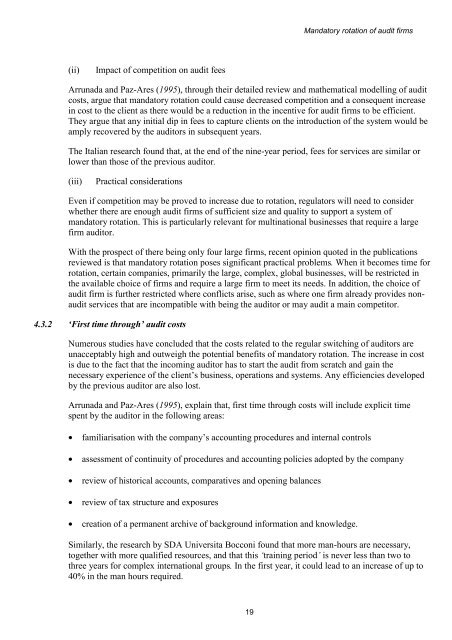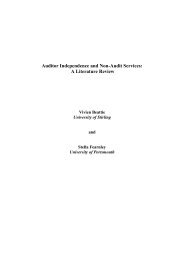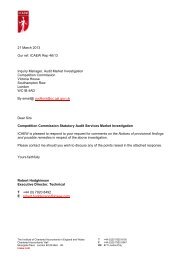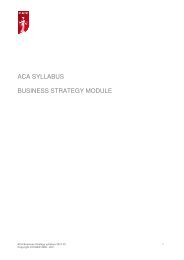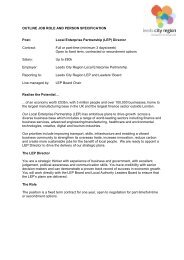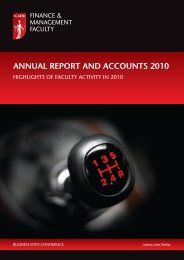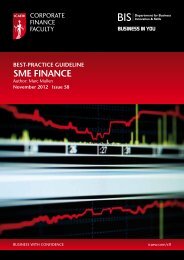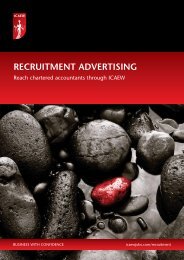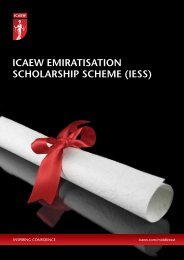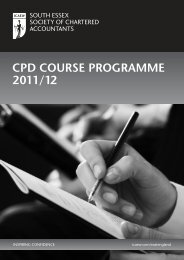Mandatory rotation of audit firms - ICAEW
Mandatory rotation of audit firms - ICAEW
Mandatory rotation of audit firms - ICAEW
You also want an ePaper? Increase the reach of your titles
YUMPU automatically turns print PDFs into web optimized ePapers that Google loves.
<strong>Mandatory</strong> <strong>rotation</strong> <strong>of</strong> <strong>audit</strong> <strong>firms</strong>(ii)Impact <strong>of</strong> competition on <strong>audit</strong> feesArrunada and Paz-Ares (1995), through their detailed review and mathematical modelling <strong>of</strong> <strong>audit</strong>costs, argue that mandatory <strong>rotation</strong> could cause decreased competition and a consequent increasein cost to the client as there would be a reduction in the incentive for <strong>audit</strong> <strong>firms</strong> to be efficient.They argue that any initial dip in fees to capture clients on the introduction <strong>of</strong> the system would beamply recovered by the <strong>audit</strong>ors in subsequent years.The Italian research found that, at the end <strong>of</strong> the nine-year period, fees for services are similar orlower than those <strong>of</strong> the previous <strong>audit</strong>or.(iii)Practical considerationsEven if competition may be proved to increase due to <strong>rotation</strong>, regulators will need to considerwhether there are enough <strong>audit</strong> <strong>firms</strong> <strong>of</strong> sufficient size and quality to support a system <strong>of</strong>mandatory <strong>rotation</strong>. This is particularly relevant for multinational businesses that require a largefirm <strong>audit</strong>or.With the prospect <strong>of</strong> there being only four large <strong>firms</strong>, recent opinion quoted in the publicationsreviewed is that mandatory <strong>rotation</strong> poses significant practical problems. When it becomes time for<strong>rotation</strong>, certain companies, primarily the large, complex, global businesses, will be restricted inthe available choice <strong>of</strong> <strong>firms</strong> and require a large firm to meet its needs. In addition, the choice <strong>of</strong><strong>audit</strong> firm is further restricted where conflicts arise, such as where one firm already provides non<strong>audit</strong>services that are incompatible with being the <strong>audit</strong>or or may <strong>audit</strong> a main competitor.4.3.2 ‘First time through’ <strong>audit</strong> costsNumerous studies have concluded that the costs related to the regular switching <strong>of</strong> <strong>audit</strong>ors areunacceptably high and outweigh the potential benefits <strong>of</strong> mandatory <strong>rotation</strong>. The increase in costis due to the fact that the incoming <strong>audit</strong>or has to start the <strong>audit</strong> from scratch and gain thenecessary experience <strong>of</strong> the client’s business, operations and systems. Any efficiencies developedby the previous <strong>audit</strong>or are also lost.Arrunada and Paz-Ares (1995), explain that, first time through costs will include explicit timespent by the <strong>audit</strong>or in the following areas:• familiarisation with the company’s accounting procedures and internal controls• assessment <strong>of</strong> continuity <strong>of</strong> procedures and accounting policies adopted by the company• review <strong>of</strong> historical accounts, comparatives and opening balances• review <strong>of</strong> tax structure and exposures• creation <strong>of</strong> a permanent archive <strong>of</strong> background information and knowledge.Similarly, the research by SDA Universita Bocconi found that more man-hours are necessary,together with more qualified resources, and that this ‘training period’ is never less than two tothree years for complex international groups. In the first year, it could lead to an increase <strong>of</strong> up to40% in the man hours required.19


